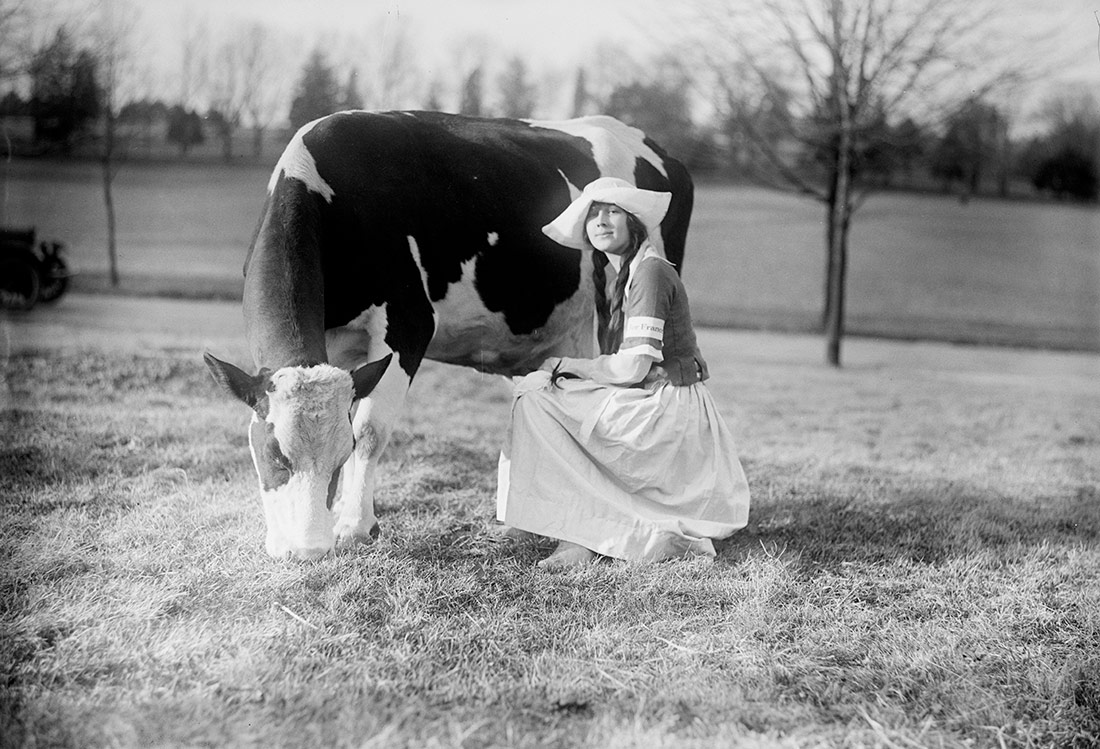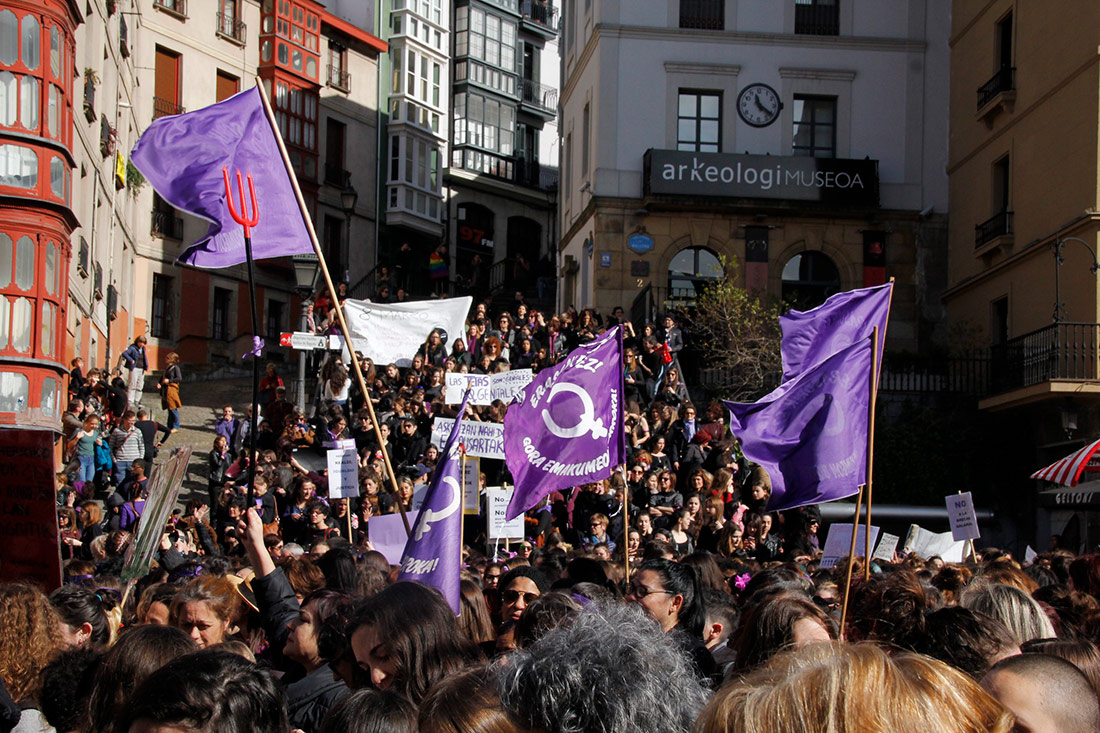
Eckles, Virginia, 1919 | Library of Congress | No known copyright restrictions
Feminism is called a movement because it is always active and in transformation, in constant and endless motion. The changes that have taken place in it over the last ten years are a reflection of the general transformations that have taken place in the spheres of society and politics. We are advancing, courtesy of Pol·len Edicions, the introduction from the new book by Mari Luz Esteban, El feminisme i les transformacions en la política. Based on her experience in the Basque context, she reflects on the feminism movement, a collective (and multigenerational) identity that is based on plural practices.
In this book I write about the changes that feminism has undergone over the last forty years, focusing on the Basque[1] context, despite the fact that I consider that many of the ideas included here transcend both the frontiers of that context and those of the feminist movement itself.[2] Basque feminism, like any other feminism, has been and is heterogenous, multiple and diverse, and it groups together highly varied collectives, positions and lines of action, some of which are compatible and others which, in contrast, are not.
I am not in a position to sketch a comprehensive and detailed portrait of all of this diversity,[3] but I will emphasise the tendencies and the most prominent features, while paying attention to the main spheres of intervention of feminism, such as the associational, institutional, professional and academic spheres. I am very much aware that this confers a greater complexity upon our activity and, in consequence, upon our analysis.
In recent years, experts in social movements have thrown into question the concept of movement. A sociologist from the University of the Basque Country (UPV/EHU), María Martínez, for example, has questioned this term in her PhD thesis on feminism in Spain and has proposed that we speak of “feminist mobilisations”,[4] arguing that the reality today is too diverse and too fragmented for the term movement to be able to cover all feminist activity.
I am not denying that this is a thought-provoking focus, but I continue to focus on the feminist movement category, because I am convinced that we live in a totality, in a unity, despite the fact that at times it is presented to us in a fragmented or internally contradictory way. Or I want to see it like that. Even more so if we take into account the readiness that Basque feminism has always shown to act collectively, as we will see later. In other words, and as explained by Jone M. Hernández,[5] being a feminist is a collective identity that is constructed on plural practices.

Women’s strike on 8 March. Bilbao, 2018 | Txeng Meng | CC BY-NC
Feminism has always been undergoing movement and it continues to do so. It is always active and undergoing change, in constant and endless motion. It has been this way, at least, to date, despite its highs and lows, crises and transformations. Whatever the case, the changes that have taken place in the last ten years are not only a reflection of the transformations that have occurred at the heart of feminism, but they also include the general transformations that have taken place in the spheres of society and politics.
I am from Basauri (Bizkaia) and I took my first steps in feminism within the Basauri Women’s Group (and the Women’s Assembly of Bizkaia). The fact that I was brought up and educated in a working-class town with a fighting spirit, one fuelled by industry and a focal point for immigration, has modelled my way of seeing and practising politics. Over the years I have taken part in different feminist initiatives and spaces and today I continue to form part of the Basauri Women’s Group and I participate in Marienea – Women’s House of Basauri as well as some initiatives based around “peace and coexistence”, to which I will refer later. My work has always been linked to spheres related with feminism: for several years I was a family planning doctor in Basauri and today I teach classes in social anthropology at the University of the Basque Country (UPV/EHU), as well as doing research in the sphere of feminist anthropology. This multiple experience has had a major impact on my career. But I think that these double or triple belongings are common to many of us and that it is necessary to reflect on their interactions, their connections and their consequences.
I am fifty-nine years old. Like myself, a large number of feminists are growing old and increasingly more white hair can be seen at our meetings. Some have left politics behind, but they continue to be willing to offer their viewpoint or to participate in the most important events. Others continue slogging as always, each in their own field. In the words of bertsolari[6] Maialen Lujanbio, “we will not grow old as young as we would wish, with smooth and radiant complexions… Just as we have not matured as young as we thought we would, nor in the mould-breaking and different way that we believed we would”.[7]
The feminist movement has a long history, of no less than forty years (depending on how its story is written), but the experience that age brings us can serve to lighten the day-to-day, just as it can also end up becoming a heavy load to bear. Furthermore, we run the risk of having lost the energy and spontaneity that young people show in the face of injustice. And the fact is that experience is not everything.
Feminism is growing old and being rejuvenated at the same time; the coexistence and coincidence of different generations is much more important than all the recognitions that we might want for ourselves. Different generations have always coexisted, in feminism. In the 1980s, for example, we were also witnesses to the emergence of young feminist collectives, but the age differences between them were not as significant as they are today. At the 4th Feminist Conference of Euskal Herria (May 2008), the last one, the existence was made clear of an entire new generation of feminists, thanks to which we can affirm that the near future is guaranteed. That was a major reason for joy.
And here we see the younger feminists carrying out their own activities and developing their own proposals and trying to do a balancing act between efforts to find their own place and the fact that they have already found it. We see, moreover, how these young women have more university qualifications than ever before but that, at the same time, many are unemployed or in precarious employment.
Whatever the case, among these young women we can also distinguish different age groups and way of doing things, as we are not before a single or homogeneous generation. In any event, in general terms, it can be affirmed that the movement – at least the part of the movement that remains outside of the institutions – is increasingly being passed into the hands of younger women. Many thanks to all of them! Many of us who are not so young are also here and we want to value their work, even if from time to time we worry about their lack of memory, while we try to control the temptation to think that all past time was better.

Women’s strike on 8 March. Bilbao, 2018 | strassenstriche.net | CC BY-NC
Feminist theory has shown a great capacity for the revision and renewal of its contents, to the point of becoming more extensive, more complex, more sophisticated and more abstract. So complex and sophisticated that, more than once, it has become and remains too distanced from practice. Among many other question marks that I will leave hanging, in this book I want to ask, precisely, whether there is not a certain imbalance between feminism theory and practice.
Our society is full of (young) feminists who are better prepared than ever before to make diagnoses and undertake all kinds of plans and projects. Some of them are already working and others are awaiting an opportunity. I am not among those who defend that feminists are capable of reaching any position or that they are the people who can best handle any responsibility. Furthermore, one thing is the theoretical preparation and another very different thing is to know how, or be able to play in the extensive and complicated field that is politics.
Moreover, feminist theory and “general” political theory all too often occupy parallel worlds, with few points of contact, and when these do exist, it is usually because women have persisted. And it is here where we are, isolated from the (sometimes) invisible networks of men that control the field of politics. In a gentlemanly and politically correct way, mind you. There are also feminist men, that is true: men actively committed to feminism who act without attaching importance to themselves. These men are also fundamental.
Over the course of the pages of this book I will use the terms woman and man, always in the social sense, because all of us are women or men socially designated as such. The reader can give them their corresponding quotation marks as she reads. I will make use of texts that I have published and lectures that I have given here and there in recent years, aiming to offer an in-depth view of my ideas, to order them and complete them. But I will still leave many issues, on which I have not reflected so much, hanging in the air.
In addition to this introduction, the book’s contents are structured into three major blocks, in the form of two chapters and an epilogue. I will start the first part with the following question: “Are we reinventing politics?” My intention is to reflect on the main characteristics of (Basque) feminism over the last forty years and its transformations. Here I will also break down some of the challenges that we have lying before us.
When I started to write this book, I did not think that there had been so many changes: I had the feeling that, somehow, we were maintaining the essence of our beginnings and that we continued to be who we always were. But I must confess that, as I was writing it, I found numerous continuities, yes, but also a large quantity of changes, some very major, that are typical of the new times in which we are living. Some of these changes quite worry me; others not as much.
In the second part, titled “Lights and shadows of some star issues”, I will focus on three questions that are of maximum importance today: power, violence and caring. The last two issues are at the heart of the feminist debate and have become fundamental questions. I will refer to them without entering into excessively in-depth analysis, but I do want to say where I see the elements for debate.

Women’s strike on 8 March. Pamplona, 2018 | Ekinklik | CC BY-SA
To finish, I want to close this book with an idea, by way of an epilogue: the idea of seeing and living feminism as a collective body, one that brings together intellect, reason, matter, emotion, sensation, imagination, etc., all at the same time. I understand feminism as a being together, as a doing things together.
I would like readers to receive the ideas presented as a proposal, a spark for debate, and for them to pass them, including those that are a little awkward, through the filter of their own arguments and experiences.
“Ruminant” is the title that I have given to this introduction, captivated by the “ruminant epistemology” of Lucrecia Masson, a feminist who was raised among cattle in Argentina who is fighting, among other things, against fatphobia.[8] Like in Argentina, in the Basque Country we also have material and symbolic relations with cows. Furthermore, if we feminists are anything, we are betizus, in other words, half-wild, untameable, headstrong.
I will finish the introduction with some illustrative ideas from the ruminant thinking of Masson:[9]
The way cows walk remains firmly etched on my retinas: they walk slowly, they walk together.
[…]
The ruminant is irreverent and iconoclastic.
She does not believe in own ideas; she knows she is not original. She knows that whenever she speaks, she is translating.
The ruminant supports an exercising of political invention that is collective, always. She tries to provide herself, for herself and for her community, tools, and she understands that these tools are not an end point that is reached, but rather something that is constantly undergoing construction.
[…]
The ruminant method is:
slow, lazy, unproductive, unsexy, big, excessive, thick-skinned, undainty, unrefined, walks slowly, is idle, slovenly, sloppy in its forms.
Ruminant epistemology rejects the rigid discourses of salvation. And it believes that there are many possible narratives.
It is along this very path that I would also like to walk. Posing questions rather than making categorical statements, talking with those who want to talk and among those who want to: young or old, expert or experienced, theoreticians or practitioners, professionals or activists, feminists who are public or anonymous, women or men designated as such… And also challenging the clashes between all these distinctions that are not always useful to us.
On November 4, Mari Luz Esteban will give a lecture at the CCCB as part of the series The Words We Don’t Yet Have.
[1] In this book, the terms Basque Country and Euskal Herria are used as synonyms and include all the Basque territories, not just those of the Basque Autonomous Community.
[2] The book El feminisme i les transformacions en la política (Barcelona: Pol·len Edicions, 2019, translated by Maria Colera Intxausti) is a revised and updated translation from a book published under the same title, in Basque, in 2017 (Feminismoa eta politikaren eraldaketak. Zarautz: Susa, in the Lisipe collection). I would like to thank Edorta Arana, Miren Guillo, Marta Luxán, Isabel Otxoa and Biki Pozo for their help in improving it.
[3] For an in-depth look at the history of the Basque feminist movement, it is necessary to consult the papers from the conferences of the years 1977, 1984, 1994 and 2008. There are other publications that have referred directly to this history, among which I would highlight two books: Movimiento de mujeres. Mujeres en movimiento, by Begoña Zabala (Tafalla: Txalaparta, 2008), and Gure genealogia feministak. Euskal Herriko mugimendu feministaren kronika bat (Our feminist genealogies. A chronicle of the feminist movement of the Basque Country), by Edurne Epelde Pagola, Miren Aranguren Etxarte and Iratxe Retolaza Gutiérrez (Andoain: Emagin Elkartea, 2015).
[4] Martínez González, María (2015). Identidades feministas en proceso. Reiteraciones relacionales y activaciones emocionales en las movilizaciones feministas en el Estado español. Doctoral Thesis. Universidad del País Vasco (UPV/EHU). Other feminists, such as Silvia Gil (Nuevos feminismos. Sentidos comunes en la dispersión. Madrid: Traficantes de Sueños, 2011), have talked about the loss of unity of the single feminism subject, as we will see later. But the fact that the subject is not a single one does not contradict the existence of a general global identity.
[5] Hernández, Jone M. (2018). «Multifaceted feminism: promoting diversity in the twenty-first century Basque Country». A: Bermúdez, Silvia; Johnson, Roberta (ed.) A New History of Iberian Feminisms. Toronto: University of Toronto Press.
[6] Translator’s note: Person who improvises verses in Basque based on traditional melodies.
[8] Masson is the author of a fanzine titled Epistemología rumiante (2015). Her proposal is based on animality, through which she dares to challenge the limits that have been imposed both on her own body and on humanity in general.
[9] Masson, Lucrecia (2015). Op. cit., p. 5, 9, 10, 19, 21.





Leave a comment